
BBC Turkish
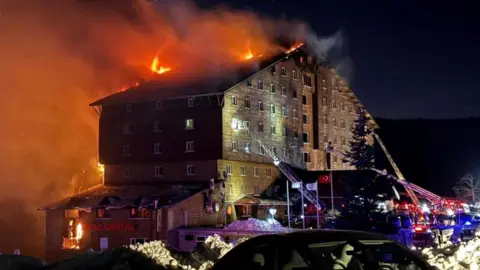 Reuters
ReutersThe fire that claimed the lives of at least 76 people at the Grand Kartal Hotel in the early hours of Monday is one of the deadliest disasters of its kind in Turkish history.
Some survivors said they did not hear an alarm, and experts told the BBC they did not expect such a large death toll in a hotel where fire protection systems were working properly.
What went wrong?
The 12-storey hotel in Turkey's famous Kartalkaya ski resort hosts tens of thousands of visitors every year, so it's understandable that Turks would want to know how such a terrible tragedy could happen at the start of a two-week school holiday.
The Interior Minister said that the fire started at 03:27 (00:27 GMT) in the dining area on the fourth floor, and firefighters arrived within 45 minutes.
Some survivors described the smell of smoke one hour earlier.
Culture and Tourism Mehmet Nuri Ersoy said that the hotel holds a firefighting competency certificate “issued by the fire department.”
But local mayor Tangu Ozkan objected to this, saying that the fire department had not issued a positive report since 2007.
Some survivors say they heard no alarm, while there have been allegations that the hotel's fire extinguishing systems were deficient.
“My wife smelled the fire,” said Atakan Yelcovan, who said he was staying on the third floor of the hotel.
“We got down before the others. The alarm did not go off… It took the fire brigade between an hour and an hour and a half to arrive. Meanwhile, the fourth and fifth floors were burning.” People on the upper floors were screaming.”
Some guests on the upper floors tried to escape with their beds and others jumped to their deaths.
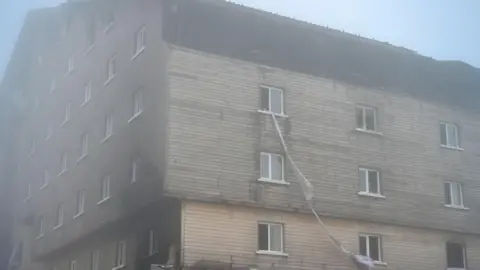 Rex/Shutterstock
Rex/ShutterstockElem Senturk said the fire alarm did not go off until after she left the building. Her husband had to jump from the hotel balcony because of the smoke: “We are very lucky to have survived.”
The BBC attempted to contact the hotel managers regarding these allegations but has not yet received any response.
Nine people, including the hotel owner, were arrested as part of the Turkish investigation.
Hotel managers issued a statement saying they mourn the losses and are fully cooperating with the authorities.
What should have happened?
In such a large building where firefighting systems are fully operational, experts say fire detectors would be expected to respond to a fire within seconds and send an alert to the fire control panel.
“In a good business, there should be someone in charge of this committee 24 hours a day, seven days a week,” Kazim Becerin, head of the Turkish Fire Protection and Education Foundation, told the BBC.
The death toll is also very high, which raises more questions.
“There will always be fires, but we do not expect this many people to die in this type of building,” said Professor Sevket Ozgur Ataylmaz, head of the mechanical engineering department at Yildiz Technical University, who has worked on fire safety planning.
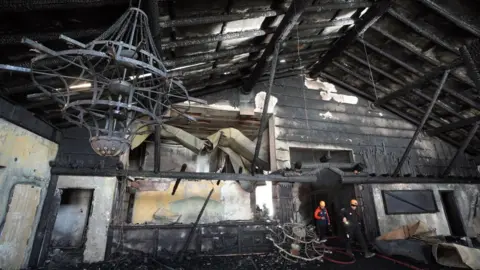 Efrem Aydin/Anatolia
Efrem Aydin/Anatolia“If the structure is properly designed to handle fires, if there are escape routes, and if smoke is properly evacuated, it is possible to overcome the fire without loss of life.”
The Minister of the Interior said that there are fire escapers, but there are indications that they are not of a good standard.
Have fire safety measures been taken?
Erol Bersin, an official from the Union of Turkish Chambers of Engineers and Architects (TMMOB) in Bolu, said the way the fire spread suggested that warning, detection and extinguishing systems may not have been in place.
He said the building's wooden exterior should have been 100 percent fireproof, but that does not appear to be the case.
The head of the Turkish Fire Protection and Education Foundation told the BBC that the size of the fire indicated that “the firefighting system either does not exist or was not designed according to standards.”
There were 238 people staying at the Grand Kartal at the time.
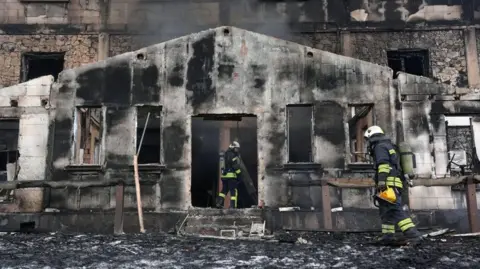 Efrem Aydin/Anatolia
Efrem Aydin/AnatoliaFire safety systems were designed with a goal of taking three minutes to evacuate each floor, and a facility with more than 200 people can be evacuated in 15 to 30 minutes under ideal conditions, Kazem Becerin said.
When the alarm goes off, the person in charge of the fire control board is expected to check the site, according to the head of the Turkish Fire Protection and Education Foundation.
If there is no indication of a false alarm or if a second detector sends a warning, fire alarms will usually be activated throughout the building.
In a properly installed system, people are then directed by announcement to the nearest fire exits, with flashing lights for the hearing-impaired or audible warnings for those sleeping.
Because fires can spread very quickly, sprinkler systems are seen as extremely important to intervene at an early stage.
The same applies to the backup power source. According to fire protection regulations, signs indicating emergency exits and lights showing the paths leading to these exits must operate for between one and three hours, even in the event of a power outage.
The Bolu Engineers and Architects Union said in a statement that “an automatic sprinkler system is mandatory” in buildings of this size.
“Photos on the hotel’s website show that the automatic sprinkler system that was supposed to be installed in 2008 was not installed. Because of this malfunction, the fire spread quickly and there were casualties.”
BBC Turkey was unable to independently confirm the allegations related to the building's wooden cladding or the hotel's fire extinguishing system.
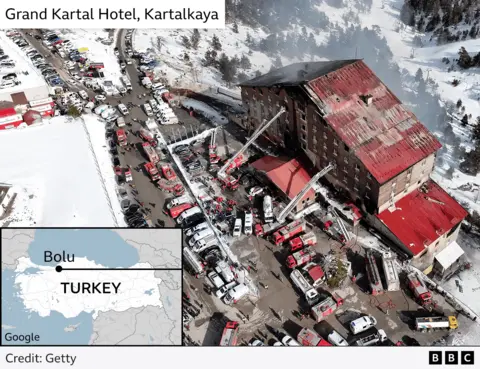
Who checked the fire safety of the hotel?
One big question is whether the hotel's fire systems have been properly inspected.
Bolu Mayor Tangu Ozcan said the Ministry of Tourism is responsible because the hotel is located outside the borders of his town. Errol Bersin agreed.
The city mayor said that the last time the Bolu municipality submitted a report stating that the hotel was fire-resistant was in 2007, and no such checks have been conducted since then.
However, Mehmet Nuri Ersoy, Minister of Culture and Tourism, said the hotel has a firefighting competency certificate “issued by the fire department” and that inspections are their responsibility.
There have also been calls for relatively old structures to be subject to scrutiny due to changing legislation.
“In crowded places such as hotels, residences, nursing homes or kindergartens, places should stop operating if they do not comply with current standards,” says Professor Ataylmaz from Yildiz Technical University.







